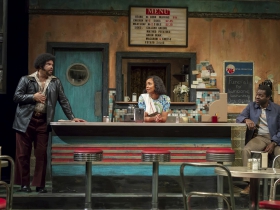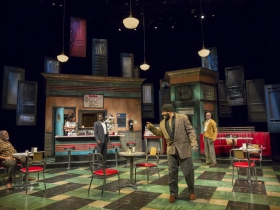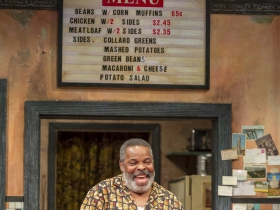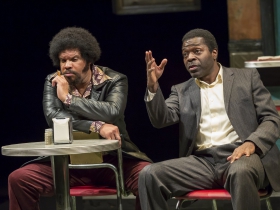‘Two Trains Running’ Is a Powerful Ride
Rep production captures August Wilson’s great characters and social poetry.
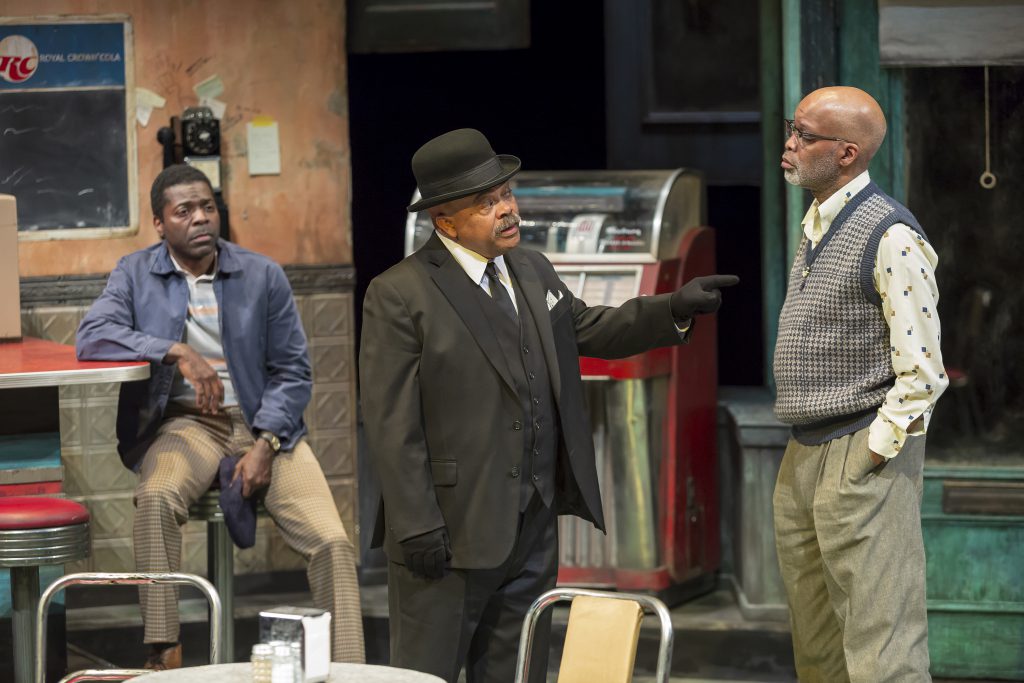
Sterling (Chiké Johnson), West (Doug Brown) and Holloway (Michael Anthony Williams) in Milwaukee Repertory Theater’s production of August Wilson’s Two Trains Running April 16 – May 12, 2019. Photo by Mikki Schaffner.
A halfwit street person charges in screaming for his ham. The numbers runner constantly howls about his sexual conquests as he jots down three-digit bets. The wealthy undertaker never sheds his black gloves or bowler hat when getting his regular cup of diner java. The cynical graying truth-teller in the back booth comments on others’ misfortunes, punctuating each speech with a jerky hand gesture. The brash talkative ex-con fills the counter air with get-rich-quick and get-love-quick schemes, his idea of wooing the waitress.
Memphis, the diner’s owner, hears all of them but mainly the footsteps of gentrification closing in and he is determined this time to outwit that white devil at city hall.
These diner denizens and their inner city neighborhood come alive in Two Trains Running through May 12 at the Milwaukee Rep. All of them serve as thematic links in a sweeping look at the urban black experience and white economic injustice.
The numbers in the story are deeper than an illicit gambling game. They’re math as dialogue music. Numbers come up in fanciful dreams about fame and fortune, about whether to toss money into the river as an invisible old auntie recommends.
These seven players are really a jazz band, throwing out themes for other characters to pick up and then improvise away from the original melody. The power of Wilson’s writing makes for darn good riffs, even if the plot doesn’t always hang together according to traditional expectations. In fact, the play is weakest when Wilson tries to twist his plot devices into story climaxes.
Two Trains Running is one of Wilson’s 10 Pittsburgh Cycle plays, this one set in 1969 and, unlike some better known outings as Fences, not following one family but cross-breeding across funerals, eminent domain, prison culture, faith healers, a shadowy underworld and individual case studies – such as Hambone, mocked and loved for his crazy ways, or Risa, the waitress who scars her legs to look ugly to men.
Within the three-hour play are some of the most soaring examples of Wilson’s social poetry, marked by the raucous laughs that good actors can create with the slightest pause or sly response built into Wilson’s rhythms. This outing at the Quadracci Powerhouse features a heavyweight cast in co-production with the Cincinnati Playhouse in the Park.
Director Timothy Douglas has a long history with Wilson’s works and a long history with excellent set designer Tony Cisek, who flies random doors around the set as if excavated from urban demolition, a counterpoint to his seedy diner with tables, stools and a hint of a working kitchen. Composer/sound designer Matthew M. Nielsen also makes the era come alive.
With false falsetto screams, outbursts of gospel and snappy gestures, Douglas elevates Wilson’s meaning in speech after speech. But it’s more a “greatest hits” album of Wilson’s visions rather than a seamless drama. The actors and director have a ways to go for that.
Striking warnings about life stem from Holloway, the back booth cynic who jumps into every conversation. His inserts are Wilson at his pithiest, explaining why he didn’t kill his grandfather or discussing how white people jump in fright the minute guns are tied to the n-people. (The play, incidentally, uses the n-word often and full of disdain for black lowlifes, but this is always blacks speaking about blacks, very familiar to the Milwaukee as well as the Pittsburgh inner city.)
Holloway is played with show stopping expertise by Michael Anthony Williams, a fine actor who sometimes seems stuck on auto-pilot. But the device of interruption is a frequent Wilson technique for many of these actors. In the middle of one discussion they wander off to another point.
It’s devastatingly right about the way people talk, change topics and then come back to the original subject. It makes the plot hard to outline because the play sings when it doesn’t need a plot. It may even be a mistake for Wilson to try to wrap neat lessons into his characters’ behavior.
This is truest in the love-hate romance of high talking ex-con Sterling and waitress Risa (played by real-life husband and wife Chiké Johnson and Malkia Stampley). The first act finds us sympathizing with Risa’s coldness toward neer-do-well Sterling, but the actors make dynamic and effective the second-act’s more cuddly interaction. It’s hard to resolve the two parts, until you realize that Wilson was about the riffs more than about consistency.
Another key member of the story runs all over the historical map, recounting his lost land in the South and then moving on to the city money grubbers cheating him of a just reward. This requires a powerful take-charge actor, Raymond Anthony Thomas, as diner owner Memphis. He serves at Wilson’s soothsayer of black doom in society, grabbing stage center in many monologues about gun rights, greedy neighbors and failures in a bigoted world.
He is also devastating in his pinpoint glares when intruding into others’ conversations. But director Douglas has a problem with such a strong cast, since we look to them even when others have the spotlight and then catch them engaged in actor business (pointed stalling) rather than character business.
Frank Britton as Hambone and Doug Brown as the undertaker are caught in this dilemma – great when they are on and not so great when they are stalling. Only Jefferson A. Russell escapes that concern because Wolf, the numbers runner, is a strutting interloper who draws the eye on every entrance. Russell is impish in incorporating the character into the action.
The play remains powerful and fully absorbing because the observations are raw, honest and revealing and the characters touch our hearts. It is life with abrupt interruptions while Wilson tries to fashion smooth theatrical resolutions to dilemmas that in reality linger on and on.
Two Trains Running Gallery
Dominique Paul Noth served for decades as film and drama critic, later senior editor for features at the Milwaukee Journal. You’ll find his blog here and here.
If you think stories like this are important, become a member of Urban Milwaukee and help support real independent journalism. Plus you get some cool added benefits, all detailed here.
Review
-
Eating Burmese in Bay View
 Dec 13th, 2025 by Cari Taylor-Carlson
Dec 13th, 2025 by Cari Taylor-Carlson
-
Casablanca Is a Milwaukee Success
 Nov 30th, 2025 by Cari Taylor-Carlson
Nov 30th, 2025 by Cari Taylor-Carlson
-
Oh, Those Witty 18th Century Brits
 Nov 24th, 2025 by Dominique Paul Noth
Nov 24th, 2025 by Dominique Paul Noth
Theater
-
Oh, Those Witty 18th Century Brits
 Nov 24th, 2025 by Dominique Paul Noth
Nov 24th, 2025 by Dominique Paul Noth
-
Skylight’s Holiday Show Is Lots of Fun
 Nov 16th, 2025 by Dominique Paul Noth
Nov 16th, 2025 by Dominique Paul Noth
-
Rep’s ‘Come From Away’ Is a Triumph
 Nov 10th, 2025 by Dominique Paul Noth
Nov 10th, 2025 by Dominique Paul Noth

